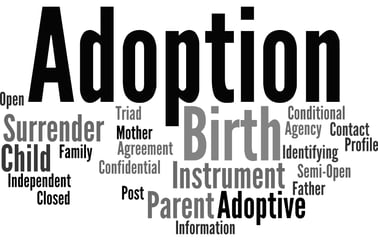While researching adoption, you will have come across a multitude of terms that are unique to adoption and may be new to you. Understanding these terms will help you whether you are a birth parent, adoptive parent, adoptee or family member.

One major key to a successful adoption journey is knowledge. Below is some common adoption vocabulary to help you understand the adoption process better.
- Birth Parent/Father/Mother: The name given to a biological parent. Studies have shown that this is the name that most biological or genetic families like best and children can understand easily. Some people prefer First Mother/Father/Parent. If you are a birth parent, you should choose whatever name for yourself you are the most comfortable with.
- Birth Child:The name given to a biological child. If your mother is your biological mother, you are her birth child. If she had placed you into an adoptive family, you would still be her birth child.
- Adoptive Parent:The name given to the parents who adopted the child.
- Adoptive Child: The term for a child that is placed into an adoptive home.
- Adoption Triad:The name given to the relationship that exists forever between the birth parent, the adoptive parents and the child. This term recognizes that the birth parent gave life to the child, the adoptive parents foster the child’s growth, and that the adopted child is forever linked to both sets of parents.
- Surrender Instrument:The legal document that is signed by the birth parent(s) that surrenders their legal rights to parent their birth child.
- Conditional Surrender Instrument: The legal document that is signed by the birth parent that surrenders their legal rights to parent their birth child on the condition that their birth child be placed into the specific adoptive family they chose and who are named in the surrender instrument. If the child is not placed into the named adoptive family, the surrender is nullified.
- Identifying Information:Any data such as last name, address, phone number, e-mail address, etc. that would let a person know who you are and be able to locate you.
- Closed or Confidential Adoption:Where no identifying information is shared between the birth family and the adoptive family and the identity of the birth parent and adoptive parents are held in the strictest of confidence.
- Semi-Open Adoption: An adoption where the birth family and the adoptive family agree on the information that is shared by each party in the adoption. Each party could agree to share some identifying information, but not all. The birth family and the adoptive family may agree to maintain contact post-adoption through a third party such as an agency. The wishes of the birth parent determine the degree of openness.
- Open Adoption:An adoption where the birth family and adoptive family have an on-going relationship. The birth parent choses the adoptive family, the two families share identifying information, and they develop a relationship with one another. The extent of the relationship is defined by the birth parent. A birth parent can ask to have on-going contact with the adoptive family prior to the child’s birth and after the adoption of the child. All of the choices for openness belong to the birth parent and are agreed upon by the birth parent and adoptive family.
- Family Profile:A booklet, web page, or video that features pictures and information about a prospective adoptive family. The profile is used by birth parent(s) to look at possible adoptive parents for their child.
- Post Adoption Contact Agreement (PACA): A legal agreement that details the post-adoption contact agreed upon by the birth parent(s) and adoptive family. For example, the Agreement may state how many times the child and the adoptive parents will send pictures and letters about the child’s progress and/or visit with the birth mother until the child is 18 years old. The Post Adoption Contact Agreement is legally binding and court enforceable for the adoptive parents in agency adoptions but not in independent adoptions (adoptions where an agency is not involved).
- Independent Adoption:Where an adoption is arranged between the birth parent and the adoptive parent with the assistance of a lawyer who represents the birth parent and a different lawyer who represents the adoptive parent. Independent adoption is legal in New York State, but there are states that will only allow agency adoptions. Each state has their own laws regarding adoption.
- Agency Adoption:Where an adoption is arranged between the birth parent and the adoptive parent by an agency. In New York State, any agency that is placing children in adoptive homes has to be authorized by the New York State Office of Family and Children’s Services. Each state has its own laws for licensing or approving an adoption agency. The birth parent has the right and the opportunity to be represented by a lawyer in an agency adoption.
We hope that this helps you to better understand the adoption process. To learn more about adoption, contact us here at Family Connections. We would be honored to speak with you and answer your adoption questions. All communications are confidential. Please contact us at 1-800-535-5556 or renee@adoptfamilyconnections.org or click below to send us your adoption questions.
Family Connections, Inc., is a not-for-profit, New York State authorized private adoption agency who has been caring for families through domestic and international adoption since 1994. We are dedicated to supporting birth parents, adoptive parents, and children touched by adoption throughout the life-long journey of adoption.




Let Us Know What You Thought about this Post.
Put your Comment Below.